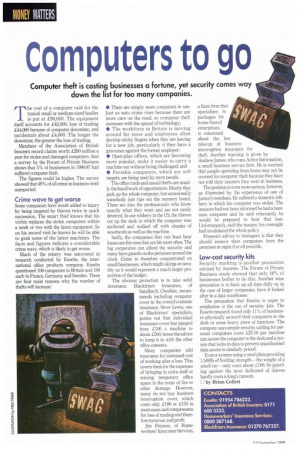Computers to go
Page 52

If you've noticed an error in this article please click here to report it so we can fix it.
Computer theft is costing businesses a fortune, yet security comes way down the list for too many companies.
The cost of a computer raid for the typical small or medium-sized haulier is put at £90,000. The equipment itself accounts for £42,000, loss of trading £44,000 because of computer downtime, and incidentals about £4,000. The longer the downtime, the greater the loss of trading.
Members of the Association of British Insurers record claims worth £200 million a year for stolen and damaged computers. And a survey by the Forum of Private Business shows that 5% of businesses in 1996-97 had suffered computer theft.
The figures could be higher. The survey showed that 49% of all crime in business went unreported.
Crime wave to get worse
Some companies have insult added to injury by being targeted by thieves twice in quick succession. The smart thief knows that his victim replaces the stolen computers within a week or two with the latest equipment. So on his second visit he knows he will be able to grab some of the latest machines. The facts and figures indicate a considerable crime wave, which is likely to get worse.
Much of the misery was uncovered in research conducted by Esselte, the international office products company. Esselte questioned 100 companies in Britain and 100 each in France, Germany and Sweden. There are four main reasons why the number of thefts will increase: • There are simply more computers in use. Just as auto crime rises because there are more cars on the road, so computer theft increases with the spread of technology; • The workforce in Britain is moving around far more and employees often develop sticky fingers when they are leaving for a new job, particularly if they have a grievance against the former employer; • Open-plan offices, which are becoming more popular, make it easier to carry a machine out without being challenged; and • Portable computers, which are soft targets, are being used by more people.
The office raids and casual thefts are usually the handiwork of opportunists. Mostly they pick up the whole computer, but occasionally somebody just rips out the memory board. There are also the professionals who know exactly what they want and are not easily deterred. In one robbery in the US, the thieves cut up the desk to which the computer was anchored and walked off with chunks of woodwork as well as the machine.
Sadly, the companies that can least bear losses are the ones that are hit most often. The big corporates can afford the security and many have guards on the premises around the clock. Crime is therefore concentrated on small businesses, which might skimp on security as it would represent a much larger proportion of the budget.
The obvious protection is to take solid insurance. Blackfriars Insurance, of Sandbach, Cheshire, recommends including computer cover in the overall contents insurance. Steve Lewis, one of Blackfriars' specialists, points out that individual insurance cover has jumped from £100 a machine to about £500, hence the advice to lump it in with the other office contents.
Many companies add insurance for increased cost of working after a loss. This covers them for the expenses of bringing in extra staff or renting temporary office space in the event of fire or other damage. However, many do not buy business interruption cover, which costs only £100 or £150 in most cases and compensates for loss of trading and therefore turnover and profit.
Jim Fresson, of Homeworkers' Insurance Services, a Kent firm that specialises in packages for home-based enterprises, is concerned about the low take-up of business interruption insurance for theft. Another warning is given by Andrew James, who runs Active Information, a small business service firm. He is worried that people operating from home may not be covered for computer theft because they have not told their insurers they were in business.
The position is even more serious, however, as illustrated by the experience of one of James's members. He suffered a domestic robbery in which his computer was stolen. The insurers had not been informed he had a business computer and he said reluctantly he would be prepared to bear that loss. Unfortunately, said the insurer, his oversight had invalidated the whole policy.
Fresson's advice to managers is that they should remove their computers from the premises at night if at all possible.
Low-cost security kits
Security marking is another precaution advised by insurers. The Forum of Private Business study showed that only 18% of businesses bother to do this. Another wise precaution is to back up all data daily or, in the case of larger companies, have it looked after in a data warehouse.
The precaution that Esselte is eager to emphasise is the use of security kits. The Esselte research found only 110/ of businesses physically secured their computers to the desk or some heavy piece of furniture. The company says simple security cabling for personal computers costs 05-30 per machine can secure the computer to the desk and a system that locks in data to prevent unauthorised data access is similarly priced.
Even a system using a steel plate providing 1,500lb of holding strength—the weight of a small car—only costs about £100. So guarding against the most dedicated of thieves hardly costs a king's ransom.
D by Brian Collett












































































































